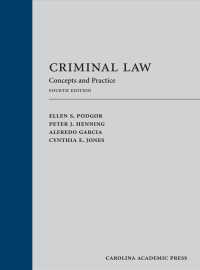- ホーム
- > 洋書
- > 英文書
- > Philosophy
Full Description
This is an open access title available under the terms of a CC BY-NC-ND 4.0 International licence. It is free to read on Oxford Academic and offered as a free PDF download from OUP and selected open access locations.
Aristotle on the Essence of Human Thought offers a novel reading of one of the most difficult stretches of text in the whole Aristotelian corpus, De anima III 4-8, showing that this stretch of text contains a unitary and coherent account of the essence of the human capacity for thought. Aristotle gives this capacity the name nous. Nous is the first principle, and ultimate explanans, of human thinking. The volume argues for four key claims. The first claim is rationalism: humans come to know the world around us via two fundamentally different cognitive powers: nous and perception. They are fundamentally different cognitive powers because the nature of their corresponding objects is fundamentally different. The second claim is essentialism: the human capacity for thought is defined as a capacity for directly grasping essences of everything there is. It is this very capacity that Aristotle shows to be the principle of all human thinking. According to the third claim, separatism, human nous is a very special kind of power. It is unmixed with the body, has no dedicated bodily organ, and is separable from the body. As a result, it cannot be assimilated to any of the other parts of the soul. While nous belongs to our essence as human beings, it is not part of the natural world. Finally, the volume argues for embeddedness in the cognitive soul: human nous is always embedded in a cognitive soul, which among other things means that the distinctive activity of human nous--thinking--can only take place in the context of a larger set of activities which are common to the body and the soul.
Contents
1: Introduction
2: Aristotle's account of the human capacity for thinking
3: The principles of propositional thought: The unity and the function of An. III 6
4: The cognitive soul and how embodied thinking comes about: The practical embeddedness of human thought
5: An. III 8: concluding theorems about human nous
6: Nous and nature
7: Conclusion: Aristotle on nous: Separatism, embeddedness in a cognitive soul, rationalism







